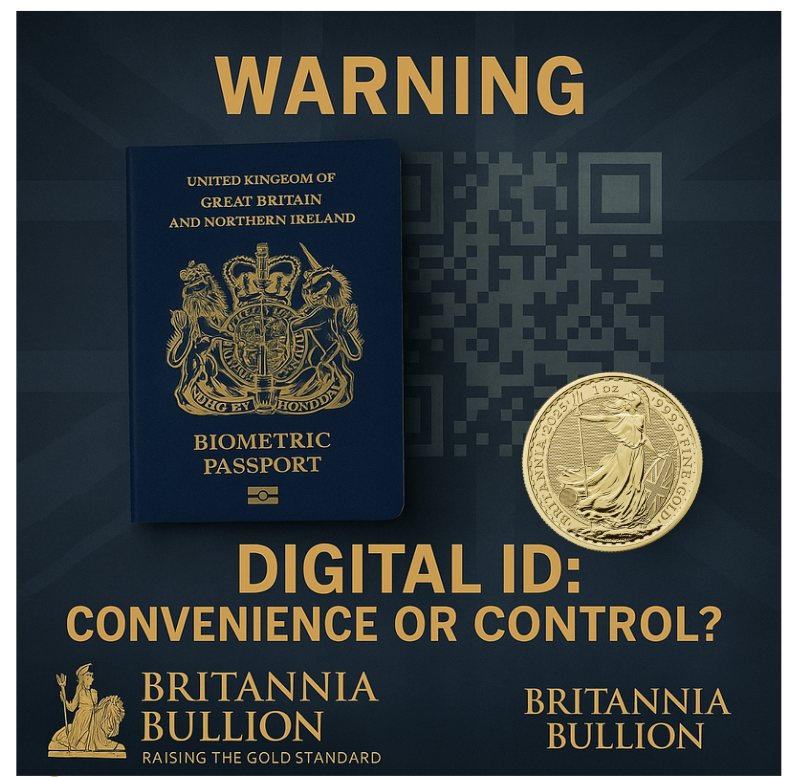
“Keep Some Savings Analogue: Why Gold Is Your Priority Pass Before the Rush”
“They want your ID, your data, your money. And they’re coming.”
We stand at a turning point. Governments are moving to digitise identity and money. Systems are being built to centralise who you are, what you own, and how you access it.
In plain English, here’s what’s happening today:
What’s happening (in plain English)
-
UK Digital ID cards (“Brit Card”). Reports indicate that the government plans to introduce mandatory digital ID cards for adults/working adults, primarily to verify the right to live and work, and to curb illegal employment. This still needs consultation and legislation, but the direction is clear. (Financial Times, The Guardian)
-
UK digital identity infrastructure, GOV.UK One Login is being rolled out as the single sign-on for all government services. The Digital Identity & Attributes Trust Framework is laying the rails. From 18 November 2025, Companies House will require mandatory ID checks for directors. (GOV.UK)
-
Across Europe, the EU Digital Identity Wallet is set to launch in 2026. This isn’t just a UK issue, it’s a global one. (European Commission)
The trend = more ID verification, more centralised systems, more reliance on digital rails.
What customers are worried about
People aren’t paranoid, they’re practical. Here are the main concerns we’re hearing every day:
-
Privacy & Data Security: More Centralised Data Means Higher Stakes If It’s Breached or Misused. Even former Cabinet Minister David Davis said:
“No system is immune to failure … if world-leading companies cannot protect our data, I have little faith that Whitehall would be able to do better.” (The Guardian)
-
“Mission creep, " today it’s for work. Tomorrow, could it be housing, healthcare, banking, or even travel? A senior Tory MP warned digital ID is “profoundly dangerous to the fundamental freedoms” of citizens. (Independent)
-
Digital exclusion/outages: What if someone’s phone breaks, their app glitches, or the servers go down? Identity shouldn’t depend on whether your phone battery died.
-
De-banking/account friction, People already feel the pain of frozen accounts and extra checks. Many worry that the more digital rails we rely on, the more mistakes will cost.
Our own brand ambassador, Ant Middleton, says:
“It was just a case of working out exactly where the fear was … then making a conscious choice to step into it.” (Goodreads)
For many, gold is that conscious choice.
Why do some hold physical gold alongside cash?
The answer isn’t to “avoid” the system, it’s to diversify and keep optionality.
-
Tangible, bearer assets, such as Gold coins, exist outside logins, apps, and systems. They are yours, in hand.
-
When liquidity is needed, our clients can sell back quickly with bank transfer settlement; gold’s recognition is global.
-
UK tax efficiency, Coins like Britannias and Sovereigns are legal tender. That means they’re Capital Gains Tax exempt for UK residents under HMRC rules. Bars are not. (GOV.UK)
-
Diversification is a hedge against inflation, policy risk, and financial shocks. (Financial Times)
Compliance note: We complete all KYC checks and operate entirely within UK law. This isn’t about avoidance. It’s about resilience.
“Keep some savings analogue. Our UK legal-tender gold coins give you a physical reserve, CGT-efficient for UK residents, with next-day insured delivery or fully allocated vaulting. It’s about optionality if the digital world gets noisy.”
The Train Is at the Platform
Think of it like this: the train is already at the station. The doors are open. Seats are filling fast. You can either step on now or stand on the platform, hoping another train comes.
Gold today is that train. By the time the rush starts, the doors will slam shut.
Or as Ant Middleton puts it, you see the fear, and you step into it anyway.
Videos to watch

